In August of this year, AFROHUN Kenya conducted field-based training for undergraduate and graduate students in One Health approaches to addressing issues within selected communities through service-learning at One Health Demonstration Sites. Thirty (30) students comprising of both undergraduate and graduate students, were exposed to multidisciplinary One Health interventions. This training is a hallmark field-based experiential learning training approach in the AFROHUN network, which has contributed to development of a future workforce that is competent in addressing complex health challenges at the community level, including outbreak response. Indirectly, it has also become evident that the current workforce that supports the training while students are in the field, have had their capacity and knowledge in One Health built and strengthened.
After several years of implementing this training approach, AFROHUN Kenya assessed the impact of One Health activities in existing One Health Demonstration Sites and identified new sites where the students were attached this year.
Field-based experiential learning opportunities provide platforms for students and faculty to interface with the practical aspects of teaching and learning. In order to provide students with this invaluable learning experience, AFROHUN designed exciting, immersive learning programs. The AFROHUN Kenya One Health Demonstration Site field attachment at Mpala Research Centre and Loitokitok is one such program. The participants had unforgettable, enriching experiences. This article provides their insightful encounters in the two places.
The Mpala Research Centre is in Ewaso ecosystem in Central Kenya. It was opened in November 1994. There are two catchment perennial rivers, Ewaso Nyiro and Ewaso Narok. The region is an expansive savanna landscape inhabited by wildlife populations. It is a beautiful terrain with varied of landscape that provides a spectacular view of various wild animals in their natural habitat. The Research Centre is a facility for research, education, and training.
The One Health Demonstration Site field attachment training was conducted for 5 days in August 2021 for students from the University of Nairobi and Moi University. The training experience exposed the students to the human-wildlife-domestic animals -environment interface.
This training approach that takes on a service-learning model, impacts students, faculty and communities in different ways.
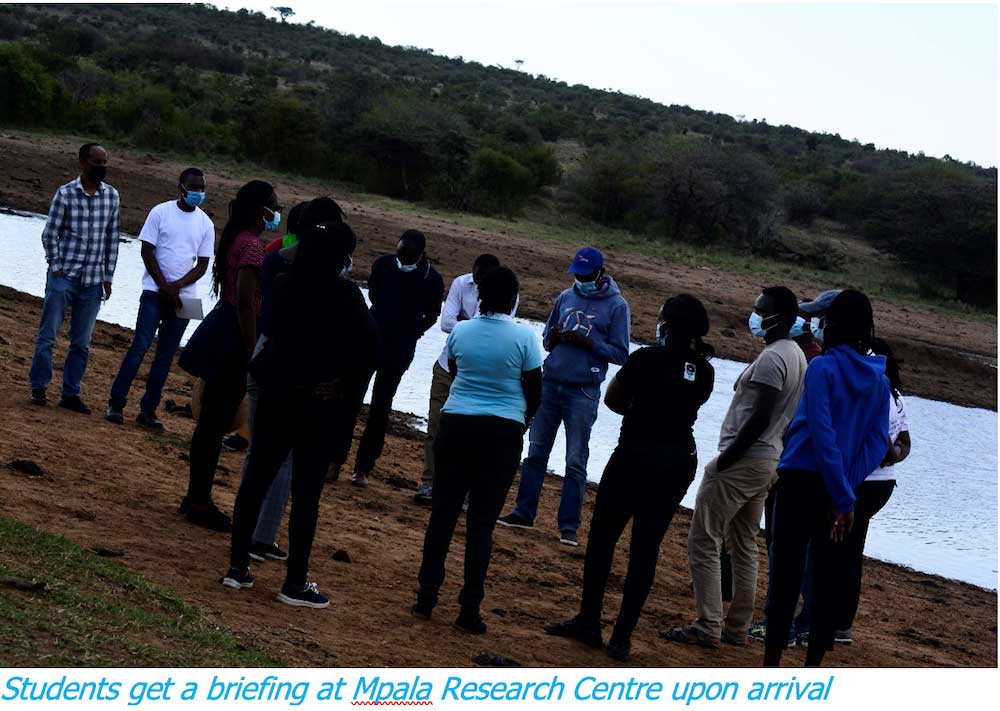
Maureen Madzo Arome, a Master of Public Health Student at Moi University, shared that the field trip was an interesting experience and a learning moment for her, which broadened her understanding of the human-animal-environment interface.
She felt that the faculty planned and administered the five-day training, in a manner that made sense to the students. She reported that, “the blend of theoretical sessions and field activities made the training very interesting and informative as the activities were well-planned and the faculty were well-prepared and informative. We had enjoyable group work sessions where group members were from different disciplines. “It was also interesting to learn about the interdependence between humans, animals and the environment where any change in one can impact negatively on the other and vice versa.”
The five-day training provided Maureen a special chance to network and interact with various professionals. She believes that this will go a long way in equipping her with necessary competencies to make a desirable impact in addressing diseases in the community as a health professional. “Networks and interactions that I built with professionals in animal and environmental health sectors will help me in surveillance, including of vectors and animals to better address diseases in the community.”
Field-based learning activities provide students with the opportunity to directly interact with the communities and conditions they will encounter once out of training. Such activities also give students the chance to apply the knowledge they have gained in the classroom. In the field, they get firsthand information from community members concerning health issues of concern.
During the visit to Mpala Research Centre, the students also visited the nearby Lelkiji Village. The community visit to Lelkiji Village was quite interesting. Interaction with the community members facilitated the application of knowledge learnt in class on principles of planning a community intervention. During this visit, priority challenges that adversely affect humans, animals and environment interactions were identified as human-animal-environment conflict, limited community knowledge on zoonotic diseases, low levels of animal vaccination of domestic animals, limited access to water and poor sanitation and poor access to healthcare, among others.
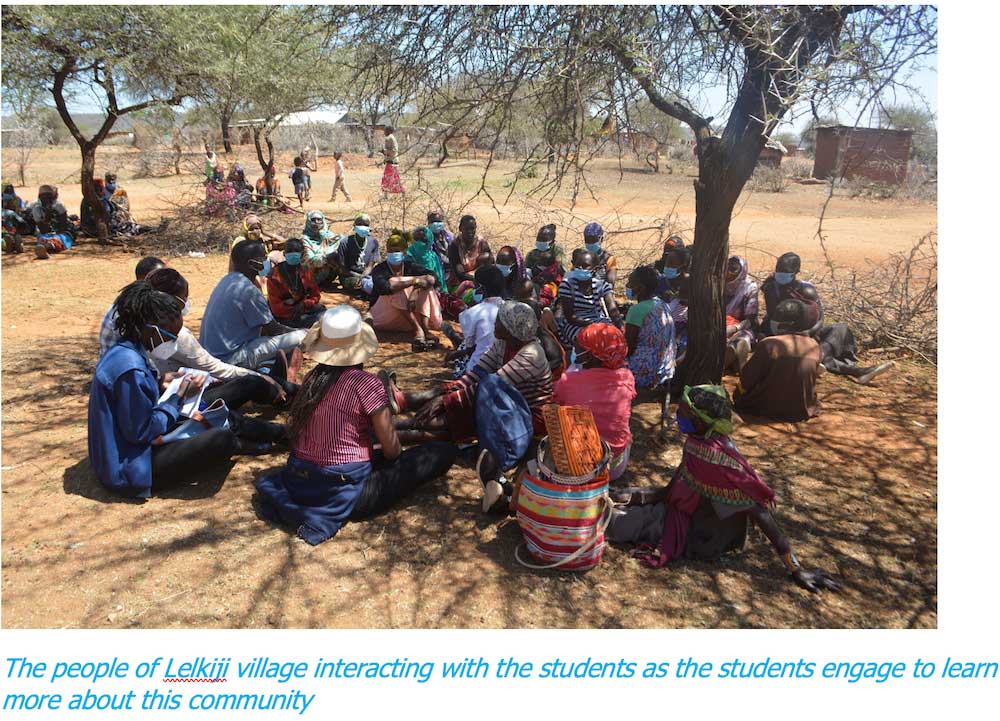
Mercy Kosgei, a Master of Public Health student at Moi University, also had a wonderful experience during the training. She discovered, through interactions, the relevance of multidisciplinary collaboration in addressing health issues involving humans, animals, and the environment.
Mercy considered the training very intensive. She says that this exposed her to something new. “As a social researcher, I am walking out of AFROHUN training knowing that all organs of the ecosystem are interdependent; thus, the need for a collaborative approach in addressing complex health issues.” She feels that her research base was broadened.
Mercy got insights into how culture drives how we view disease transmission and prevention which is a key determinant in how communities respond to prevention and responses to disease outbreaks. This is a key determinant in how we view diseases and how we respond to advice on prevention and control. “It is important to have in-depth understanding of peoples’ cultural values, social and environmental conditions and how they impact human behavior. Human behavior has direct influence (negative or positive) on the environmental system. This, results in changes on the climate which in turn affects humans, wild and domestic life”. This complex interaction of factors illustrated to Mercy the value of the One Health approach.
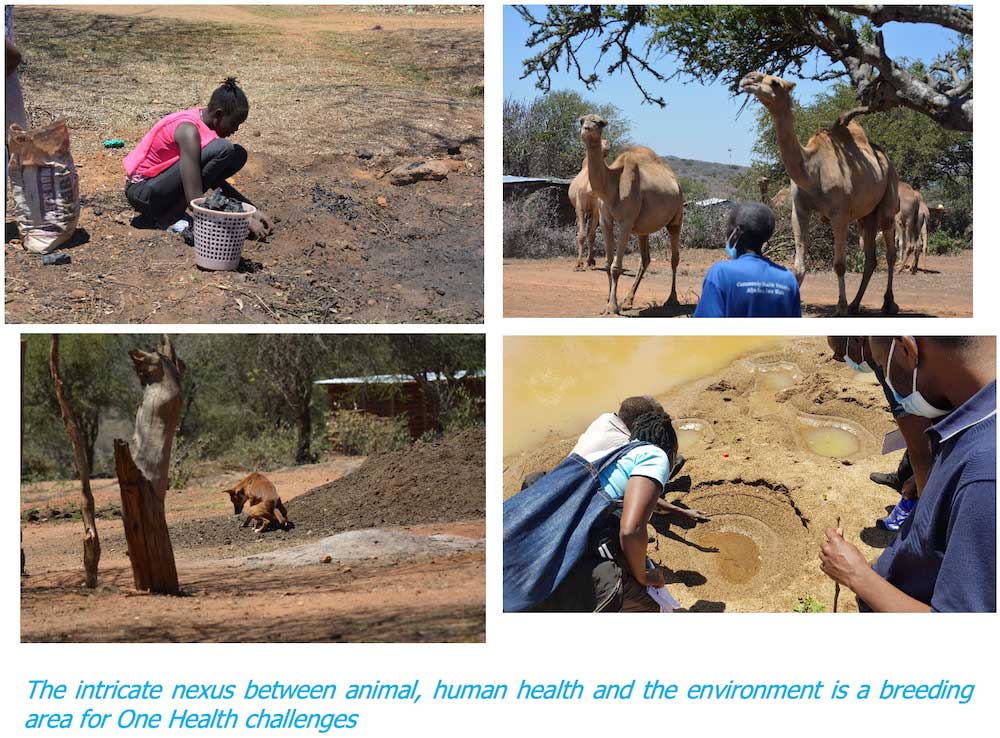
During the demonstration site training, Edith Tesot, a Master of Nursing student (maternal and neonatal health) at Moi University, observed several things that needed intervention. One challenge was that humans, domestic and wild animals shared a common, unprotected water source which leads to transmission of diseases between species.
Edith noted that to break the chain of disease transmission, the community needs to be sensitized on prevention measures, safe use of locally available resources, existence of zoonotic and communicable diseases, and how to prevent disease outbreaks
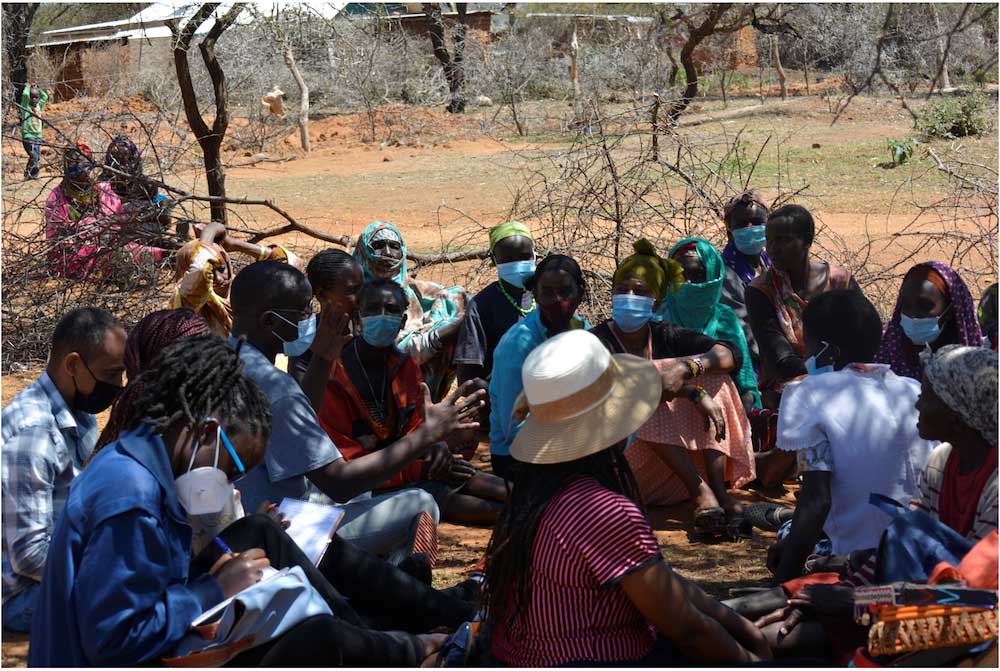
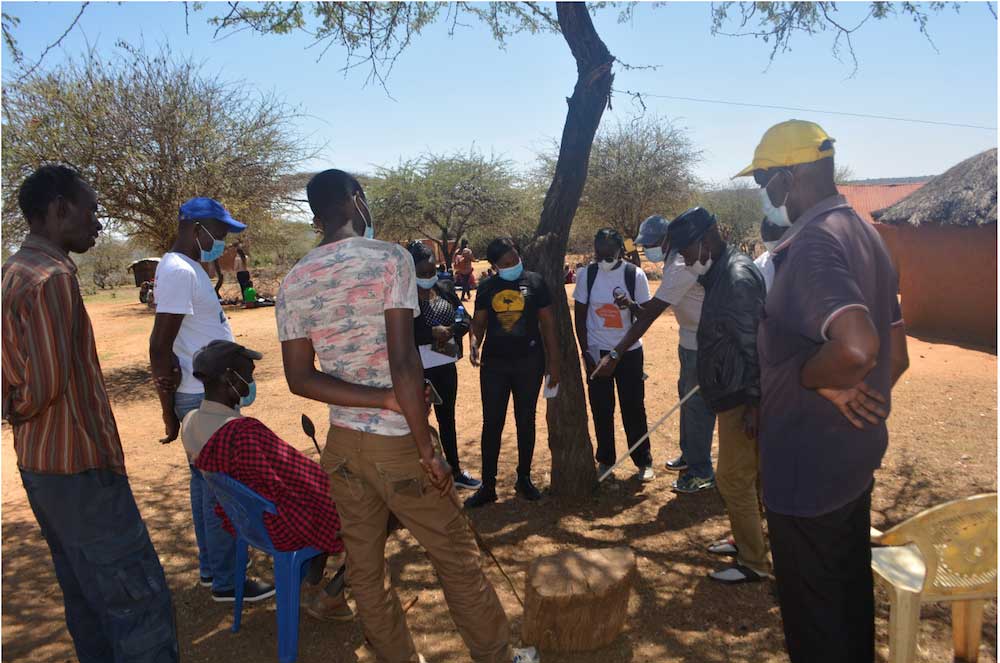
Dr. Janerose Muturra, a veterinarian had a very enriching experience during the field activity at Mpala Research Centre. Before coming to Mpala for the field experience, she only had a theoretical comprehension of the One Health concept. However, the encounter at Mpala gave her deeper insight into the practical aspects of it. “I had a theoretical understanding of the One Health concept from my interaction with it as an undergraduate through the University of Nairobi, One Health Club but I was struggling with how to incorporate it in my work as a veterinarian.”
As part of the team that engaged the men of Lelkiji village, Janerose observed the importance of understanding existing social norms at the planning stage. This, according to her, helps to achieve community ownership of interventions and guarantees impact.
The major problem, according to Janerose, that the people of Lelkiji community face is waterborne diseases. This is because they share water sources with domestic and wild animals. There are also fears that they are exposed to metals and pesticides that come from upstream where agricultural activities are practiced.
“I would love to thank AFROHUN for the opportunity to interact with the different professions and to put One Health in practice.” Her earnest prayer is that “the cohort will keep the fire burning and will grow to form a consortium that will inform positive policy changes in the region”, she said
For Marianne Awuor Odhiambo, the field-based training was a life-changing exposure. “I now have the required knowledge and skills to further improve myself as a One Health practitioner.” One of the main attractions for her during the training was the role of data in improving research outputs, prevention and control of diseases. According to her, “data-informed estimates of financial uncertainties and projections of costs of health and animal insurance premiums with predictions of expected zoonotic outbreaks should be encouraged from the community level.”
Rachel Otuko, a Public Health Officer and an Epidemiology and Biostatistics student at the University of Nairobi shared that this experience enhanced her analytical and communication skills in a way that no other training has done. The field-based activity was a time of growth for her.
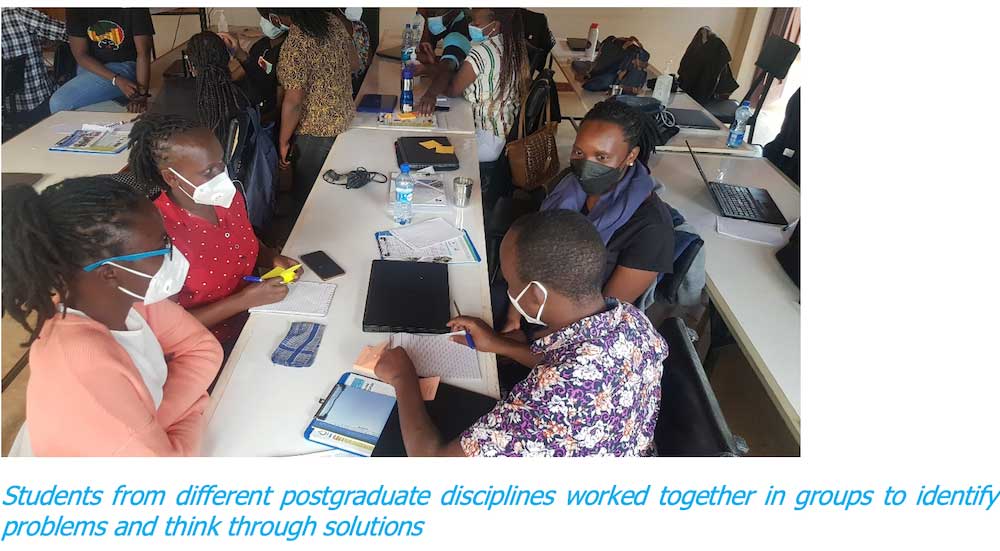

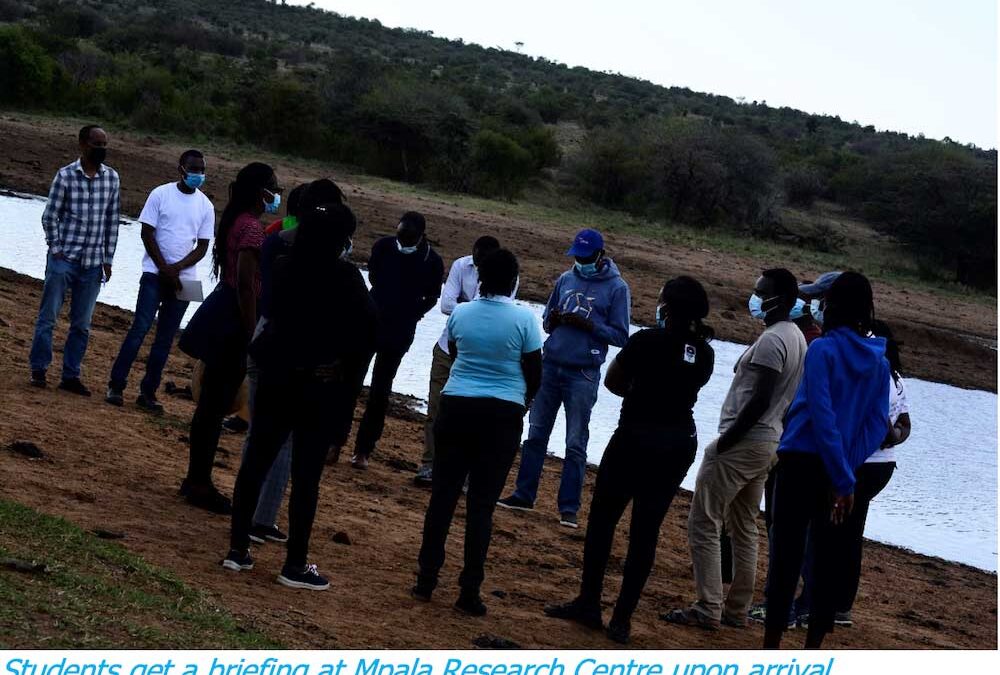
As a graduate student of Public Health (Health Services Management) at Moi University, the chance to visit the Mpala Research Centre could not have come at a more opportune time. It was an eye opener and a first for me in many ways. I made friends with individuals from diverse academic and professional backgrounds. The history and serenity of the conservancy, the flora and fauna, the very educative classroom sessions moderated by very knowledgeable facilitators and field visits (not to mention the sumptuous meals) brought the One Health concept all together for me.